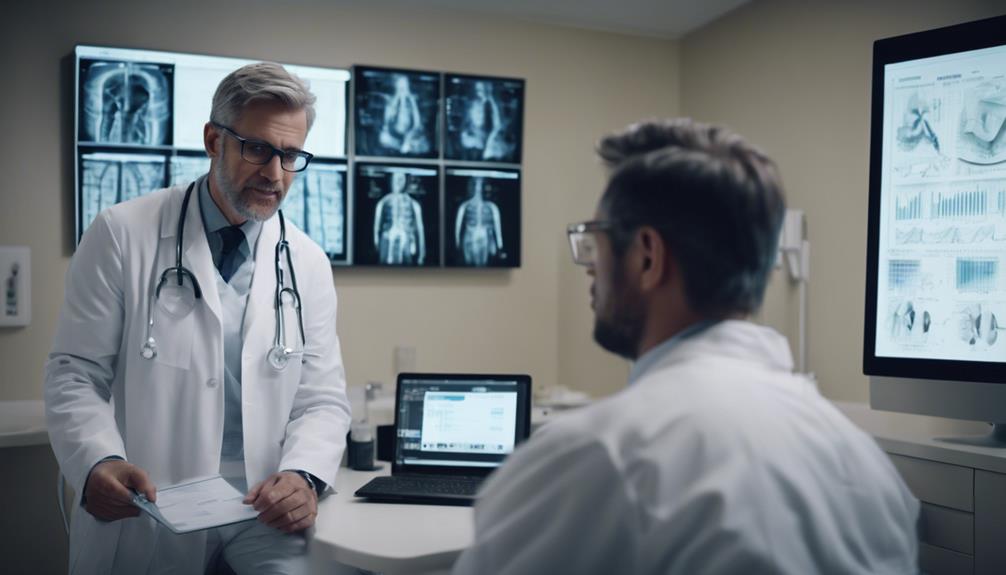The Benefits of Regular Check-Ups and Screenings
Have you ever wondered how regular check-ups and screenings can impact your overall health?
The benefits go beyond just a quick appointment with your healthcare provider.
By staying proactive and prioritizing these appointments, you are setting yourself up for a multitude of advantages that can positively influence your well-being in the long run.
From early detection to peace of mind, each check-up plays a crucial role in safeguarding your health and ensuring you are equipped with the necessary information to make informed decisions.
Key Takeaways
- Early detection through screenings improves prognosis and treatment options.
- Preventive measures reduce health risks and contribute to overall well-being.
- Regular health monitoring enables proactive care and timely interventions.
- Health education empowers individuals to make informed decisions for better outcomes.
Early Detection
Regular check-ups and screenings play a crucial role in early detection of potential health issues, allowing for timely intervention and treatment. Early detection through regular screenings significantly improves the prognosis of various conditions. By identifying health problems at their initial stages, healthcare providers can implement interventions promptly, leading to better outcomes for patients.
For instance, routine screenings for conditions such as cancer can detect abnormalities before symptoms manifest, increasing the chances of successful treatment and recovery.
When health issues are detected early, treatment options are often less invasive and more effective. Regular screenings not only aid in identifying diseases early but also provide an opportunity for healthcare professionals to educate individuals on preventive measures and lifestyle modifications that can further enhance their health and well-being.
Preventive Measures
To actively safeguard your health and well-being, adopting preventive measures in addition to regular check-ups is essential. Preventive care plays a crucial role in maintaining overall wellness and reducing the risk of developing serious health conditions. By focusing on wellness promotion through preventive measures, you can take proactive steps to prioritize your health.
Engaging in preventive care involves various strategies such as staying up to date with vaccinations, maintaining a healthy diet, exercising regularly, managing stress effectively, and avoiding harmful substances like tobacco and excessive alcohol consumption. These actions not only help prevent diseases but also contribute to your overall well-being.
Regular health screenings are another vital aspect of preventive care. These screenings can detect potential health issues early on, allowing for timely interventions and treatment. By incorporating preventive measures into your healthcare routine, you empower yourself to take control of your health and lead a healthier, more fulfilling life. Remember, prevention is key to long-term wellness and vitality.
Health Monitoring
Monitoring your health regularly is crucial for early detection of potential issues and maintaining overall well-being. Engaging in regular monitoring through check-ups and screenings allows for proactive preventive care. By staying vigilant and aware of your health status, you increase the chances of early intervention if any concerns arise. This heightened health awareness enables you and your healthcare provider to address any issues promptly, potentially preventing more serious health complications down the line.
Routine health monitoring involves tracking key indicators such as blood pressure, cholesterol levels, blood sugar, and weight. These metrics provide valuable insights into your health status and can signal the need for further evaluation or lifestyle adjustments. Regular screenings, such as mammograms, colonoscopies, and skin checks, are also essential for early detection of conditions like cancer.
Disease Prevention
Maintaining optimal health requires proactive measures to prevent diseases. Prevention strategies play a crucial role in reducing the risk of developing various health conditions. By following screening guidelines tailored to your age, gender, and medical history, you can detect potential issues early on and take steps to mitigate their impact. Regular screenings such as blood pressure checks, cholesterol tests, and cancer screenings can help identify problems before they progress to advanced stages.
Incorporating healthy lifestyle habits like maintaining a balanced diet, engaging in regular physical activity, managing stress, and avoiding harmful substances like tobacco can significantly lower your chances of developing chronic diseases. Vaccinations are also essential in preventing certain infectious diseases that can have severe consequences if contracted.
Treatment Planning
When considering your health, effective treatment planning is essential to address any identified issues and optimize your well-being. Personalized care tailored to your specific needs and preferences is crucial in achieving the best outcomes. Patient involvement in the decision-making process empowers you to take an active role in your treatment journey. Care coordination among healthcare providers ensures seamless transitions between different levels of care, enhancing the quality and continuity of your treatment.
| Benefits of Effective Treatment Planning | |
|---|---|
| Personalized Care | |
| Tailored to your specific needs and preferences | |
| Treatment Options | |
| Explore various options to find the best fit for you | |
| Patient Involvement | |
| Empowerment through active participation in decisions | |
| Care Coordination | |
| Seamless transitions between different levels of care |
Lifestyle Adjustment
Wondering how lifestyle adjustments can positively impact your health and well-being? Making changes to your diet and exercise routine can significantly enhance your overall quality of life. Here are three key ways lifestyle adjustments can benefit you:
- Diet Modification: By focusing on a balanced and nutritious diet, you can provide your body with the essential vitamins and minerals it needs to function optimally. Incorporating more fruits, vegetables, whole grains, and lean proteins while reducing processed foods and sugars can help improve your energy levels, mood, and overall health.
- Exercise Routine: Engaging in regular physical activity not only helps you maintain a healthy weight but also boosts your cardiovascular health, strengthens your muscles, and enhances your mental well-being. Aim for at least 150 minutes of moderate-intensity exercise per week to experience these benefits.
- Overall Well-Being: Combining diet modification and an exercise routine can lead to better management of chronic conditions, reduced risk of diseases, improved sleep quality, and increased longevity. Prioritizing these lifestyle adjustments can empower you to take control of your health and enjoy a higher quality of life.
Risk Management
To effectively manage your health risks, it is crucial to stay proactive and informed about potential threats to your well-being. Risk management involves identifying factors that may jeopardize your health and taking proactive steps to reduce these risks. By focusing on risk reduction and health maintenance, you can enhance your overall well-being and quality of life.
Risk Management Strategies
| Risk Factor | Potential Impact | Management Strategies |
|---|---|---|
| Sedentary Lifestyle | Obesity, Heart Disease | Regular Exercise |
| Poor Nutrition | Vitamin Deficiencies | Balanced Diet |
| Smoking | Lung Cancer, COPD | Smoking Cessation Programs |
| High Stress Levels | Hypertension, Anxiety | Stress Management Techniques |
Health Education
Interested in enhancing your knowledge and skills to make informed decisions about your health? Health education plays a vital role in patient empowerment and wellness promotion.
Here are three key aspects to consider:
- Empowering Patients: Health education empowers you to take control of your health by providing you with the knowledge and skills needed to make informed decisions. When you understand your body and how to maintain good health, you become an active participant in your well-being.
- Preventive Measures: By educating yourself about preventive measures such as healthy lifestyle choices, regular screenings, and early warning signs of diseases, you can proactively work towards maintaining good health. Prevention is often more effective and less costly than treatment.
- Promoting Wellness: Wellness promotion is at the core of health education. It focuses on not just the absence of disease but the overall well-being of an individual. Through health education, you can learn how to optimize your physical, mental, and emotional health, leading to a higher quality of life.
Peace of Mind
For individuals seeking peace of mind, regular check-ups and screenings can provide reassurance about their current health status and early detection of potential health issues. Taking proactive steps towards monitoring your health not only contributes to your mental wellness but also aids in stress reduction. Knowing that you are actively taking care of your well-being can alleviate anxiety and uncertainties about your health. By staying up to date with screenings, you empower yourself with knowledge that can lead to early intervention if any concerns arise. Below is a table highlighting the mental wellness and stress reduction benefits of regular health check-ups and screenings:
| Benefits | Description |
|---|---|
| Mental Wellness | Regular check-ups can offer peace of mind and a sense of control over your health. |
| Stress Reduction | Early detection of health issues can prevent prolonged worry and reduce stress levels. |
Long-Term Benefits
Regular check-ups and screenings offer not only immediate peace of mind but also long-term benefits that contribute to maintaining optimal health and well-being. Here are three key long-term benefits you can expect:
- Improved Longevity and Quality of Life: Regular screenings can detect health issues early, allowing for timely interventions that can significantly impact your overall health and lifespan. By identifying potential risks before they escalate, you can work with healthcare providers to manage conditions effectively and enhance your quality of life.
- Financial Savings and Reduced Healthcare Costs: Prevention is often more cost-effective than treatment. By investing in regular check-ups and screenings, you're more likely to catch health concerns in their early stages when they're easier and less expensive to manage. This proactive approach can help you avoid costly medical procedures and long-term healthcare expenses.
- Peace of Mind for the Future: Knowing that you're taking steps to safeguard your health through regular screenings can provide a sense of security and confidence about your well-being in the long run. This peace of mind can positively impact your mental health and overall outlook on life.
Improved Outcomes
Enhancing your health outcomes through regular check-ups and screenings can lead to better management of existing conditions and early detection of potential health risks. By staying proactive in monitoring your health, you increase the chances of an improved prognosis and better survival rates. Regular screenings can help catch diseases in their early stages when treatment is most effective, ultimately leading to better health outcomes and increased longevity.
Research shows that individuals who undergo routine check-ups are more likely to detect illnesses such as cancer, diabetes, and hypertension earlier, allowing for timely intervention and management. This proactive approach not only improves the quality of life but also enhances the overall prognosis of various health conditions. Moreover, regular screenings can contribute to better survival rates by enabling healthcare providers to implement appropriate treatment plans promptly.
Empowered Decision-Making
By actively participating in regular screenings and check-ups, you empower yourself to make informed decisions about your health and well-being. When you take charge of your healthcare journey, you're better equipped to navigate the choices that impact your overall wellness. Here are three key ways in which empowered decision-making can positively influence your health empowerment:
- Knowledge is Power: Through regular screenings, you gain valuable insights into your current health status, enabling you to make proactive decisions to maintain or improve your well-being.
- Early Detection Saves Lives: Making informed choices about screenings can lead to early detection of potential health issues, significantly increasing treatment success rates and prognosis.
- Personalized Care Plans: By actively engaging in check-ups, you can work with healthcare providers to develop personalized care plans tailored to your individual needs, promoting a holistic approach to your health.
Taking an active role in your healthcare through regular check-ups and screenings not only empowers you to make informed decisions but also enhances your overall health and quality of life.
Frequently Asked Questions
What Are Some Common Misconceptions About Regular Check-Ups and Screenings?
Misconceptions about check-ups and screenings can lead to avoidance. Consistency in these appointments is vital for early detection. Your health deserves attention. Regular visits can catch issues early, improving outcomes and quality of life.
How Can Individuals Overcome Barriers to Accessing Regular Check-Ups and Screenings?
To overcome barriers to accessing regular check-ups and screenings, you can explore telemedicine for easy access, seek financial assistance if needed, educate yourself on healthcare options, challenge cultural beliefs, and advocate for your health needs.
Are There Specific Populations That May Benefit More From Regular Check-Ups and Screenings Than Others?
Incorporating preventative care initiatives is essential for addressing the health needs of high-risk populations. Regular check-ups and screenings can be particularly beneficial for specific groups, as they allow for early detection and timely intervention.
What Role Do Genetics Play in the Effectiveness of Regular Screenings and Check-Ups?
In the realm of personal health, genetic factors can significantly influence screening effectiveness. Genetic testing can unveil predispositions that impact the efficacy of check-ups. Understanding these connections can empower you to make informed decisions about your health.
How Can Technology and Innovations in Healthcare Impact the Future of Regular Check-Ups and Screenings?
Embrace how technology revolutionizes healthcare. Remote monitoring and predictive analytics enhance future check-ups and screenings. Stay informed about your health with these advancements, ensuring proactive care and timely interventions for better outcomes.
Conclusion
In conclusion, regular check-ups and screenings offer a multitude of benefits that can greatly impact your overall health and well-being. By staying proactive in monitoring your health, you can catch potential issues early, take preventive measures, and make informed decisions about your treatment plan.
Remember, your health is your most valuable asset, so make sure to prioritize regular screenings to ensure a healthier future. Don't wait until it's too late, take charge of your health today and reap the rewards tomorrow.












